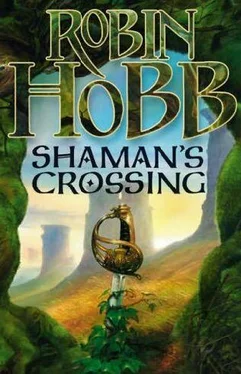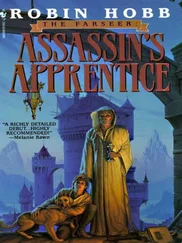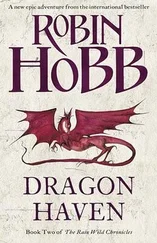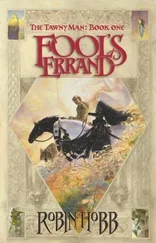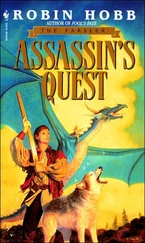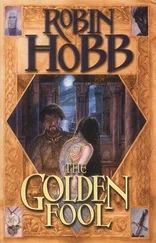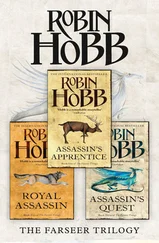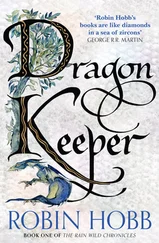Traffic between the eastern frontier and old Fort Renalx to the west of us was frequent along the river road. In winter, when the waters of the river ran high and strong, barges laden with immense, sap-heavy spond logs from the wild forests of the east moved west with the current, to return later laden with essential supplies for the forts. Teams of barge mules had worn a dusty trail on the south bank of the river. In summer, when the depleted river did not offer enough water to keep the barges from going aground, mule-drawn wagons replaced them. Our village had a reputation for honest taverns and good beer; the teamsters always stopped there for the night.
But today the seasonal traffic that crawled the road was not so convivial. The slow parade of men and wagons stretched out for half a mile. Dust hung in the wake of their passage. Armed men rode up and down the lines. Their distant shouts and the occasional crack of a whip were carried to us on the light wind from the river.
Three or four times each summer, the coffle trains would pass along the river road. They were not welcome to stop in the village. Not even the guards who moved the coffle along could take the ferry across to my father’s well-run town. Hours down the road, out of view of both my home and the village, there were six open-sided sheds, a fire pit and watering troughs set up for the coffle trains. My father was not without mercy, but he distributed it on his own terms.
My father had strictly forbidden my sisters to witness the passing of the penal trains, for the prisoners included rapists and perverts as well as debtors, pickpockets, whores, and petty thieves. There was no sense in exposing my sisters to such rabble, but on that day Sergeant Duril and I sat our horses for the better part of an hour, watching them wend their dusty way along the river road. He did not say that my father had wished me to witness that forced emigration to the east, but I suspected it was so. Soon enough, as a cavalry trooper, I’d have to deal with those whom King Troven had sentenced to be settlers on the lands around his eastern outposts. My father would not send me to that duty ignorant.
Two supply wagons led the penal coffle making its centipedian way toward us. Mounted men patrolled the length of the winding column of shackled prisoners. At the very end, choking their way through the hanging dust, teams of mules pulled three more wagons laden with the women and children that belonged to the convicts trudging their way toward a new life. When a trick of the wind carried the sounds of the prisoners to us, they sounded more animal than human. I knew that the men would be chained, day and night, until they reached one of the King’s far posts on the frontier. They’d be fed bread and water, and know a respite from their journey only on the Sixday of the good god.
“I feel sorry for them,” I said softly. The heat of the day, the chafing shackles, the dust; sometimes it seemed a miracle to me that any of the criminal conscripts survived their long march to the borderlands.
“Do you?” Sergeant Duril was disdainful of my soft sentiment. “I feel sorrier for the ones left behind in the city, to continue being scum the rest of their lives. Look at them, Nevare. The good god decrees for every man what he is to do. But those down there, they scoffed at their duty, and ignored the skills of their fathers. Now the king offers them a second chance. When they left Old Thares, they were prisoners and criminals. If they weren’t caught and hanged, they’d probably be killed by their fellows, or live out their lives like rats in a wall. But King Troven has sent them away from all that. They’ll walk a long hard way, to be sure, but it’s a new life that awaits them in the east. By the time they get there, they’ll have built some muscle and endurance. They’ll work on the Kings Road for a year or so, pushing it across the plains and then they’ll have earned the right to their freedom and two acres of land. Not bad wages for a couple of years of toil. King Troven’s given them all a new chance to be better than they were, to own land of their own and to live a clean life, to follow in their fathers’ trades as they should have done, with their old crimes forgotten. You feel sorry for them? What about the ones who refuse the King’s mercy, and end up with the chopping block taking their thieving hands off, or living in debtors’ prison with their wives and little ones alongside them? Those are the ones I pity, the ones too stupid to see the opportunity our king offers them. No, I don’t pity those men down there. They walk a hard road, and no mistake, but it’s a better road than the one they originally chose for themselves.”
I looked down at the ragged line of chained men and wondered how many truly felt it had been their own decision to choose this course. And what of the women and children in the wagons? Had they had any choice at all? I might have pondered longer if Duril had not distracted me with the terse word, “Messenger!”
I lifted my eyes and looked toward the east. The river snaked off into the distance, and the river road followed its winding course beside it. Passenger coaches, freight wagons and the post travelled that road. Ordinary mail travelled in wagons for the most part; letters to soldiers from their families and sweethearts in the west and their replies. But King Troven’s couriers travelled that road as well, bearing important dispatches between the far outposts and the capital in Old Thares. Part of my father’s duty to his king as a landed noble was to maintain a relay station and the change of horses for the messengers. Often the dispatch riders were invited up to my father’s manor for the evening after they had passed on their messages, for my father enjoyed being kept up to date on events at the frontier, and the messengers were glad of his generous hospitality in the harsh land. I hoped we would have company for the evening meal; it always enlivened the conversation.
Along the river road a man and horse were coming at a gallop. A thin line of dust hung in the still air behind them, and the horse was running heavily in a way that spoke more of spurs and quirt than willing effort. Even at our distance, I could see the billowing of the rider’s short yellow cape that marked him as the king’s courier, and notified every citizen of the duty to speed him on his way.
The watcher at the relay station below us had spotted the incoming rider. I heard the clanging of the bell and in the next moment the inhabitants of the station sprang into action. One ran into the stable, to emerge almost immediately leading a long-legged horse wearing a tiny courier’s saddle. He held the fresh mount at the ready, while another man dashed out from the station bearing a waterskin and a packet of food for the rider. A fresh rider emerged, his face already swathed against the dust, his short bright yellow cape flapping in the river wind. He stood by his mount and waited for the message to be passed to him.
We watched as the messenger approached the station and then saw a frightening thing. The messenger only pulled in when his horse was abreast of the fresh mount. His feet never touched the ground as he lunged from one saddle to the next. He shouted something to the waiting men, leaned down to snatch up the packet of provisions and waterskin, and then set spurs to the new horse. In an instant he was gone, galloping down the centre of the road and through the penal coffle. Shackled men and mounted guards surged out of his way as he passed. There were angry shouts and cries as a section of the chained men were trampled by one of the mounted guards when they did not get out of the way quickly enough to avoid the horse. Heedless of the milling chaos in his wake, the courier was already dwindling to a tiny figure on the ribbon of road leading west. I stared after him for a moment, and then glanced back down at the relay station. A stableman was trying to lead the messenger’s horse, but the animal went suddenly down on his front knees, and then rolled onto his side in the dust. He lay there, kicking vaguely at the air.
Читать дальше
